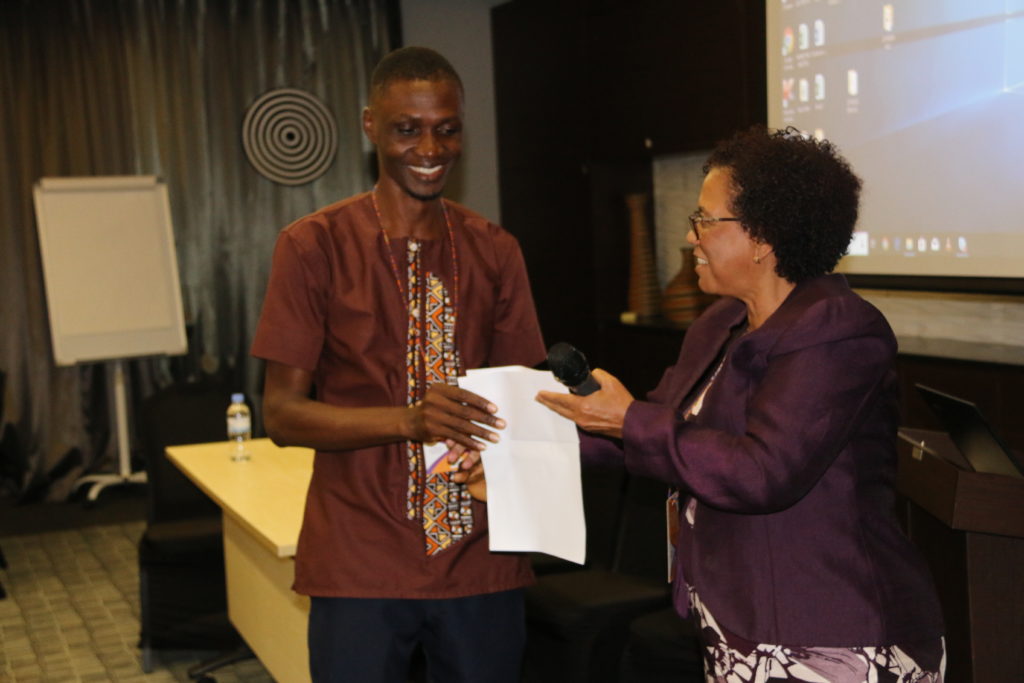Ninety-one people from fourteen countries in sub-Saharan Africa (SSA), as well as the USA, UK, and Peru, convened in Kigali, Rwanda on 24 August, 2019, for the 10th Annual Sweetpotato for Profit and Health Initiative (SPHI) at the Ubumwe Hotel in Kigali. The theme of this year’s SPHI meeting was ‘Sweetpotato’s Role in Africa’s Food Systems: Reaching Diverse Groups in Diverse Settings’.

The meeting was officially opened by Krishnan Bheenick, Director for Corporate Partnerships for the Forum for Agricultural Research in Africa.
The meeting featured presentations and discussions on the progress in sweetpotato science and delivery along the entire sweetpotato value chain from scientists and experts from the agriculture, nutrition and development communities.
Dr. Julius Okello from the International Potato Center (CIP)-Uganda gave an update on the current status of sweetpotato in Sub-Saharan Africa. Following the status update, Margaret McEwan moderated a panel discussion on “Have we successfully tackled the seed system bottleneck?”. The panelists included private sector seed producers Serge Ganza and Wilfred Mushobozi, and three researchers for development specialists working in different countries: Felistus Chipungu (Malawi), Abiyot Aragaw (Ethiopia), and Elias Munda (Mozambique).
Jan Low moderated an additional panel on Are sweetpotato processed products key for driving urban demand? with three private sector processors, Antonio Magnaghi (Euro-Ingredients), Emmanuel Darkey (Ghana), Faustin Akimanishatse (Urwibitso Enterprises), and two other panellists working on getting fresh root markets moving as well as processed products, Roland Brouwer (CIP) and Stanley Mwangi (FCI),
This year 10 participants also had a chance of presenting their posters. Each poster presenter had 60 seconds to pitch to participants why they should visit their poster stand. Then all participants had time to visit the posters and vote for best poster. Felistus Chipungu won best poster titled “Root and Tuber Crops (RTC) for Agricultural Transformation in Malawi: progress at three years” and Eric Dery won the second prize for his poster “Development of a Sensory Lexicon for describing boiled sweetpotato in Ghana”.

Felistus Chipungu receives an award for best poster from Dr Maria Andrade 
Eric Dery receives an award for his poster from Dr Maria Andrade
A new brochure developed based on SASHA research conducted by the Natural Resources Institute and the University of Development Studies in Ghana was launched, entitled: Handle with Care: Maintaining the Quality and Value of your Sweetpotato Roots after Harvest through Better Practice. Copies were distributed to all.
There was also an exhibition and poster presentation by Esther’s Aid an organization based in Kigali, Rwanda. Clare Effiong, a former diplomat, is the founder and director. The organization provides free life-changing skills through its technical training and education programs to impoverished youth and young women who have been abused and exploited. The organization has set up a bakery “Heavenly bakery”. The bakery incorporates orange-fleshed sweetpotato into their baked products such as bread, cakes, muffins and cookies. Over the last 15 years, she said, the organization has helped feed, clothe, shelter and educate more than 8,000 people across the board.
One of the meeting highlights was the awarding of two $500 prizes each under the Excellence in Sweetpotato Competition:
- Best Sweetpotato Scientific Paper in 2018 was awarded to Dr Mercy Kitavi Molecular Breeder and Capacity Building Scientist for a paper written with 32 other scientists from the Genomic Tools for Sweetpotato project, entitled Genome sequences of two diploid wild relatives of cultivated sweetpotato reveal targets for genetic improvement, published in the prestigious Nature Communications in December 2018. Mercy presented this paper at the meeting after receiving the award.

- Communication for Change Award was awarded to Putri Erna Abidin, Issahaq Suleman, and Daniel Akansake, Tom van Mourik, and Margaret McEwan for “Scaling orange-fleshed sweetpotato and the Storage in Sand and Sprouting (Triple S) innovation package in Ghana with farmer-to-farmer training videos”.



1 Comment. Leave new
Tanzania should be considered as a priority country for CIP because it has large population and land is potential for both orange -fleshed sweetpotato and potato.